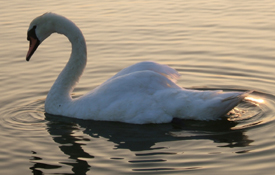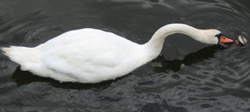
 |
|
|
In Florida, flamingos, black (Australian) swans, mute swans, peacocks, and other birds can be found at hotels and resorts, golf courses, and in residential developments. Purchased for display, as “ornaments” in ponds, they are often neglected and subject to abuse.
left:
Swan investigates a soda can tossed in a pond at a restaurant
in Boca Raton. As with any animal, proper care for large birds takes knowledge, commitment and resources that are unfortunately often lacking. Ornamental birds suffer from an inadequate diet of white bread and handouts, and from fertilizers and other harmful chemicals that end-up in ponds. When they become too expensive to care for, or when their novelty wears off (swans can live over 25 years), they can end up penned in horrible conditions or abandoned. Ornamental birds often have little fear of humans, and have become victims of human cruelty. In Florida, they have also fallen prey to dogs and alligators, and suffered injuries from fishing hooks, vehicles and golf balls. What
You Can Do — If your community has ornamental birds, make sure they are properly cared for and are prevented from reproducing. Bird populations can be controlled humanely by treating eggs to prevent them from hatching. *In Florida, possession of swans, flamingos and other waterfowl requires a state license. The possession of some species of ornamental birds also requires a federal permit. |
|
|
1431 N. Federal Highway • Fort Lauderdale, Florida 33304 • (954) 727-ARFF


 There
are few animals as graceful as swans, or as beautiful as flamingos.
Unfortunately, it is their grace and beauty that makes these birds
popular as ornamental animals.
There
are few animals as graceful as swans, or as beautiful as flamingos.
Unfortunately, it is their grace and beauty that makes these birds
popular as ornamental animals. Ornamental
birds are denied their natural habitat and natural behaviors.
The feathers of these birds are usually clipped, a permanent amputation
that prevents them from flying. Birds that were born to fly great
distances instead remain flightless.
Ornamental
birds are denied their natural habitat and natural behaviors.
The feathers of these birds are usually clipped, a permanent amputation
that prevents them from flying. Birds that were born to fly great
distances instead remain flightless.